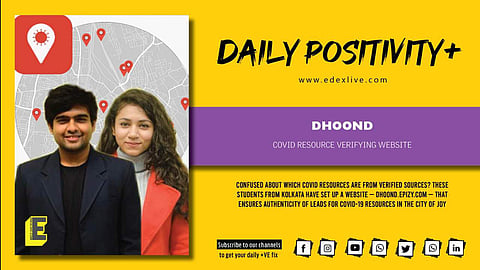

While social media is abuzz with COVID-related information, not all of them are verified or even useful. There is news almost every day regarding fraudulent leads and blackmarketeering of resources when there is an acute shortage of medicines, oxygen and hospital beds across the country. In order to solve the issue of frauds and provide verified leads to people in need, students from various colleges in Kolkata came together to set up a website. Launched a few weeks ago, dhoond.epizy.com is ensuring authenticity of leads and curating verified leads on the website.
Students from premier institutions in Kolkata including Jadavpur University, St Xavier's College, Scottish Church College and others came together to mitigate fraud and ensure resources reach people in time.
Vedant Mozumdar, a student of Economics at JU played a major role in developing the website and is now working on getting updates done. "The website is an interface for COVID resources, the user enters their location, what they currently need or are looking for, they are then directed to that specific location for the specific need. So, if you are looking for oxygen leads in your location, the website will direct you to just that. We have our team where everyone individually verifies the leads crowdsourced from the internet and social media to eliminate fraud," he says.
The website uses location intelligence for people to find resources such as oxygen, plasma, hospital beds, medicines easily. "Initially, the website used to show the entire map of India and then again you had enter your state, city to get the information, so it was a more tedious process. Now, you can enter the pincode and search in that specific area and the resources there and around will show up. Google map will also show you directions from your home to the particular place nearby where you can acquire the resource from," adds Vedant.
The core team includes ten students Samriddho Ghosh, Shrestha Baisnab, Debanjali Mitra, Ishita Gupta, Hridraj Biswas, Riya Bahety, Arshia Roy, Ayushi Dutta, Sayak Das Gupta, Shambhobi Bagchi, Subhosri Dhar, Vedant Mozumdar and Aban Mandal.
Arshia says when her seniors Samriddho and Shrestha, who are co-founders of the website, reached out, she jumped in on the opportunity. "I manually verify the leads. The team has been segregated into departments now as there is a lot of information," she adds.
Samriddho, an architecture student from JU and the co-founder of dhoond, adds that the team follows a three-step manual verification process. "It is unstructured but there are hoards of data available on social media. We take it and we structure it first then we start calling the leads one by one. We have a checklist such as exhorbitant pricing, weird demands like 'The patient party has to come before a specific time or we aren't providing it' and then we categorise them into bad or fraudulent leads. Bad leads are still those where you will get the resource such as oxygen but at a later time and by paying a bit more than usual. Fraudulent ones are 'You pay today but you will get it tomorrow', these are some of the red flags we detect and then we cut their names off our list," he tells us explaining their process of verification.
Speaking on how they are different from a lot of people collating information, Samriddho adds, "When you see leads on social media you get to see one thing in common - the location. We have to find something in and around that. This is what we call location data and hence we try to tap in all the leads in and around that. There is a huge location database on an excel sheet and it's not possible for one person to go through that when in an emergency, so we have plotted it on a map and it saves a lot of time."
The students are also in the process of making an app to make the platform more accessible.
